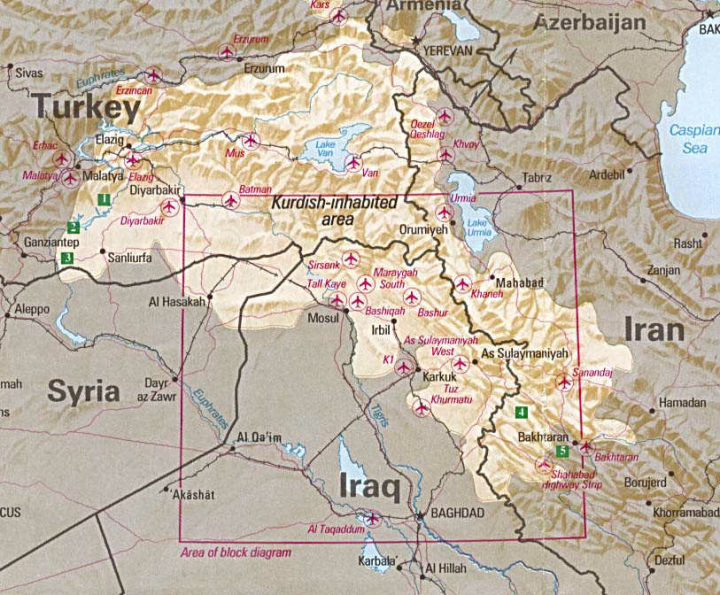
I spent most of my youth (ages 7-18) in Beirut, Lebanon, and might have stayed were it not for war. Kurds there were a vivid part of the human landscape. Many of the men had jobs in the Suq (bazaar) as porters; mostly wiry and compact, they carried astounding loads on their backs, for example full-size refrigerators, using a sort of harness with a forehead strap. This looked kind of medieval, but in some of these alleys there was hardly room to turn around let alone bring in a truck, so I wouldn't be surprised if it's still going on. The Kurdish women stood out in the crowd in their beautiful dresses in many bright colours, their heads sparkling with silver coin-spangled jewelry. Historically, the Kurds have got a raw deal for some centuries - just possibly they may benefit from the current crisis.
My Dad's photo collection doesn't seem to include any portraits of Kurds, but Google has a few, my favorite is here.
Most Kurds live in Turkey and Iraq, with a few in neighboring countries. The government of Turkey has practiced systematic racist oppression of the Kurds for as long as I can remember - use of the term "Kurd" or the Kurdish language being officially punishable by imprisonment and unofficially by torture and death. There are two sides to this coin - there is an active Kurdish movement which would like to turn part of Turkey into independent Kurdistan, and that movement has itself descended to extreme violence and occasional terrorism.
Such an old pattern - Turks and Kurds denounce each other as subhumans and pronounce themselves innocent as the driven snow; this pattern seems predictable whenever one ethnic group tries to include in its country an ethnic group that doesn't want to be part of the country. Particularly when the inclusion process comprises racist policies of cultural extinction. Sometimes the includer wins, sometimes they lose, terror is always part of the picture.
The Kurds in Iraq have fared a little better; while Saddam has on occasion gassed and massacred them, he hasn't (unlike the Turks) systematically tried to deny their existence or suppress their language. During the recent years of Saddam's extreme weakness (oh, I'm sorry, I forgot he's actually terribly dangerous and we must be afraid of him) the Iraqi Kurds have managed to achieve de facto autonomy under no-fly-zone cover. Their territory is split between two mutually-hostile political camps, but it's substantially less autocratic than most of the rest of the Middle East, and suffers little from fundamentalist religion. The Turks allege, probably correctly, that their own Kurdish independentistas lurk in Northern Iraq and make trouble from across the border.
All this is the subtext to the recent Turkish political turmoil. The Turkish parliament recently (narrowly) voted down a deal that would have given the US access to northern Iraq via Turkey. Turkey would have been paid off handsomely in cash, and been given U.S. blessing to march into Kurdish northern Iraq - the Kurds there have given warning that they will fight if this happens.
This action of the United States was cowardly and despicable; hideously immoral and entirely indefensible. Since the Turks turned around and drop-kicked the deal, it also turned out to have been an amateurish foreign-policy blunder. It is impressive that the Turkish parliament passed up on this opportunity to indulge in ethnic barbarism and get paid for it; perhaps the time is near when they will deserve a serious chance at EU membership and other benefits of being civilized.
One of these years one hopes that the US policymakers will learn that when you line up with corrupt oppressors, whether they be in Guatemala, Iran, Saudi Arabia, Angola, or anywhere else, just because they are enemies of your enemy, you always come out behind. Always. The US is supposed to be a nation based on ideals; the idea of a foreign policy based on those ideals rather than heartless geopolitical expediency is innovative and worth a try.
Back to the Kurds; what will happen when the US kicks over the Iraqi house of cards? The Iraqi Kurds, one gathers, have been told that they must not officially seek independence because of the Sacred Principle of the Immutability Of International Boundaries, even when those borders are the shaky-handed pencillings of fuckbrained colonial administrators with heads full of brandy fumes.
Although the Turkish parliament is acting wisely, it's hard to imagine the Turkish military won't march into Iraq, and it's hard to imagine the Kurds won't fight. Also, quite likely, some Kurds will make a grab for the oil-drenched Mosul and Kirkuk neighborhoods in northern Iraq, and it's hard not to imagine somebody pushing back. But, at the end of the day, maybe the Kurds will end up no worse off than they are now: with at least some of them left more or less alone on some of their own home turf. I hope so - the ones I knew were awfully good people and deserved better from the world.